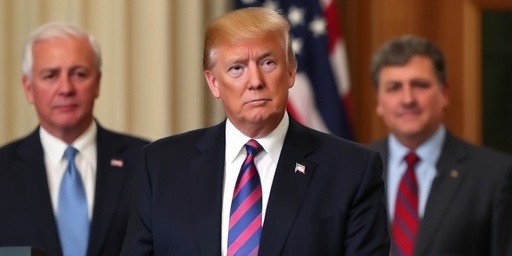In a high-stakes move to solidify his incoming administration, President-elect Donald Trump‘s transition team is pressing Senate leaders to expedite confirmation hearings for his cabinet nominees, aiming to wrap up key approvals before the holiday break. With Republicans clinging to a narrow 53-47 majority in the Senate, the urgency underscores potential roadblocks from Democrats and even some within the GOP, as Trump‘s picks face intense scrutiny over past controversies and policy alignments.
Trump‘s Bold Cabinet Selections Spark Immediate Senate Buzz
President-elect Trump’s cabinet nominations have already ignited fierce debates on Capitol Hill, blending familiar faces from his first term with fresh, controversial figures. Among the most prominent is Matt Gaetz, the firebrand Florida congressman tapped for Attorney General, whose nomination has drawn sharp criticism due to ongoing ethics investigations. Trump’s team argues that Gaetz’s loyalty and prosecutorial zeal make him ideal to overhaul the Justice Department, but Senate Democrats are vowing to probe deeply into allegations of misconduct.
Other key picks include Robert F. Kennedy Jr. for Health and Human Services Secretary, a choice that has alarmed public health experts given RFK Jr.’s vaccine skepticism. Tulsi Gabbard, the former Democratic congresswoman, is eyed for Director of National Intelligence, bringing her anti-interventionist stance into the fold. And Elon Musk, the tech billionaire, has been floated for a role advising on government efficiency, though not a formal cabinet post, his influence could ripple through confirmations.
According to a statement from Trump’s transition spokesperson, “The President-elect is committed to assembling a team that will deliver results for the American people without delay. We’re working hand-in-glove with Senate leadership to ensure these confirmations happen swiftly.” This push comes as the transition period, typically a whirlwind of logistics, is compressed by the need to hit the ground running on January 20.
Historical data from past transitions shows that rapid confirmations can set the tone for an administration’s early agenda. In 2017, Trump’s first-term cabinet saw 22 nominees confirmed in the first 100 days, but delays plagued several, including Labor Secretary nominee Andrew Puzder, who withdrew amid scandals. This time, the transition team is leveraging lessons learned, scheduling informal meetings with senators even before formal hearings begin.
Senate Republicans Grapple with Slim Majority for Confirmations
The Republican Senate’s slim 53-47 edge, secured after a grueling election cycle, places immense pressure on Majority Leader John Thune to unify his caucus. With only a few defections affordable on party-line votes, Trump’s more polarizing picks could test loyalties. Senators like Susan Collins of Maine and Lisa Murkowski of Alaska, known for their moderate stances, have signaled they will demand thorough vetting processes.
“We have a responsibility to the American people to ensure these nominees are qualified and ethical,” Collins said in a recent interview with The Hill. Her comments highlight the delicate balance: support Trump’s agenda without alienating constituents wary of his nominees’ baggage.
Thune, stepping into the majority leader role post-Mitch McConnell, has pledged to prioritize confirmations. In a closed-door meeting with GOP senators last week, he outlined a timeline aiming for most hearings in December, citing the holidays as a natural cutoff. “Our slim majority means we can’t afford gridlock,” Thune told reporters. “We’ll move quickly but not recklessly.”
Statistics from the Senate’s confirmation history underscore the challenge. During Biden’s 2021 transition, 24 cabinet-level positions were confirmed in under 100 days, but that was with a Democratic trifecta. Trump’s 2017 experience saw an average of 45 days per confirmation, delayed by Democratic filibusters and GOP infighting. With the filibuster still intact for nominations—though reconciliation rules might apply—the Senate could invoke cloture votes to speed things up, requiring 60 votes that might necessitate bipartisan buy-in.
Internal GOP dynamics add layers. Hardliners like Ted Cruz applaud Trump’s aggressive picks, viewing them as a bulwark against “deep state” influences. Yet, fiscal conservatives question nominees like Musk, whose proposed Department of Government Efficiency could slash budgets dramatically. A Pew Research Center poll released this week shows 58% of Republicans support fast-tracking Trump’s cabinet, compared to just 22% of Democrats, highlighting the partisan divide.
Democrats Mount Defense Against Fast-Tracked Hearings
While Republicans push the accelerator, Senate Democrats are digging in, questioning the wisdom of rushing confirmations amid holiday distractions. Minority Leader Chuck Schumer has warned that expedited processes could sideline important oversight, especially for nominees with checkered histories.
“Rushing these hearings risks rubber-stamping unqualified individuals,” Schumer stated on the Senate floor. “The American public deserves a full accounting of these picks’ records.” Democrats point to Gaetz’s involvement in the January 6 investigations and RFK Jr.’s promotion of debunked health theories as red flags warranting extended scrutiny.
Bipartisan support remains elusive but not impossible. Some moderate Democrats, like Joe Manchin—now an independent but caucusing with Democrats—have expressed openness to nominees who align on energy policy. Manchin, a key swing vote in the previous Congress, could be pivotal if Republicans seek to avoid filibuster battles.
Quotes from transition insiders reveal the strategy: a senior advisor to Trump told Politico anonymously, “We’re not asking for blind approvals; we’re asking for efficiency. Delays only benefit our opponents.” Yet, procedural hurdles loom. The Senate calendar, packed with lame-duck sessions on spending bills and judicial confirmations, leaves limited slots for hearings. Senate rules allow for committee markups, but with 21 nominees needing Judiciary, Finance, and other panels’ approval, coordination is key.
Context from recent transitions illustrates the stakes. Obama’s 2009 confirmations averaged 30 days, aided by goodwill post-election. Bush’s 2001 process faced post-9/11 unity but still hit snags. For Trump, the polarized climate—exacerbated by his 2020 election challenges—could prolong debates, potentially pushing some confirmations into 2025 and hobbling policy implementation.
Navigating Transition Logistics Amid Confirmation Urgency
Behind the scenes, Trump’s transition operation—headquartered in Washington D.C.—is a hive of activity, coordinating with federal agencies for briefings and security clearances. The Presidential Transition Act mandates support from the General Services Administration, but Trump’s team has criticized past delays, vowing a more streamlined approach this time.
Key to this is the Office of Presidential Personnel, which vets thousands of potential appointees. For cabinet confirmations, FBI background checks are underway, with Trump’s picks reportedly fast-tracked to meet the holiday deadline. A transition memo leaked to The Washington Post details plans for 15 hearings in the next three weeks, focusing on non-controversial picks first to build momentum.
Challenges extend beyond politics. Nominees must navigate ethics disclosures; for instance, Gabbard’s potential conflicts from her media roles are under review. Musk’s involvement, though advisory, raises questions about federal contracting with Tesla and SpaceX, potentially requiring recusal agreements.
Public opinion plays a role too. A Quinnipiac University poll indicates 49% of voters believe confirmations should prioritize speed, while 42% favor thoroughness. Trump’s base, energized by his victory, demands quick action on promises like border security, where nominees like Tom Homan for border czar could make immediate impacts if confirmed.
International eyes are watching. Allies in Europe and Asia await clarity on U.S. leadership, with Trump’s foreign policy picks like Mike Pompeo for Secretary of State signaling continuity in tough stances toward China and Iran. Delays could unsettle markets; the Dow Jones has fluctuated 2% in the past week on transition uncertainties.
Prospects for Post-Holiday Momentum and Policy Rollouts
As the December 20 holiday recess approaches, Trump’s team is optimistic about securing at least half of the cabinet by year’s end, setting the stage for aggressive executive actions in January. Success here could enable rapid implementation of tax cuts, deregulation, and immigration reforms—core Trump promises.
Looking ahead, even if some confirmations spill into the new year, the Republican trifecta offers leverage. House Speaker Mike Johnson has aligned with Senate efforts, promising floor votes post-holidays. Bipartisan deals might emerge on less divisive picks, like education or veterans affairs secretaries, to grease the wheels.
Experts foresee a transformative period. “A swift transition will amplify Trump’s mandate,” says Brookings Institution analyst Sarah Bindler. “But any stumbles could fuel opposition narratives of chaos.” With Supreme Court vacancies potentially on the horizon and midterm elections looming in 2026, the confirmation battles will shape the GOP’s future.
Ultimately, the push for rapid confirmations reflects Trump’s hallmark impatience for bureaucracy. If successful, it could mark one of the fastest cabinet assemblies in modern history, propelling his America First agenda forward at full throttle. Stakeholders from Wall Street to Main Street await the outcomes, as the Senate’s slim majority holds the key to unlocking the 47th presidency’s potential.








